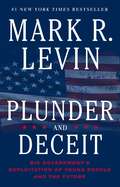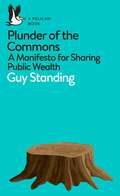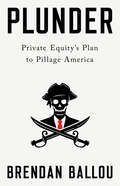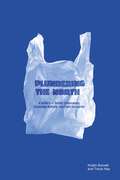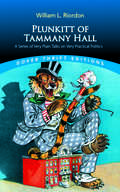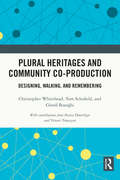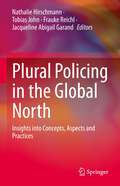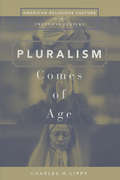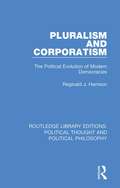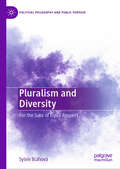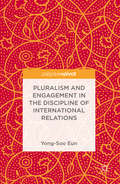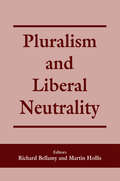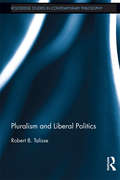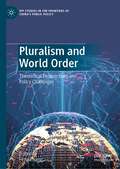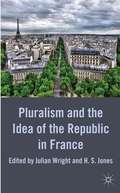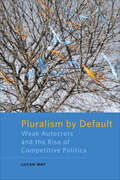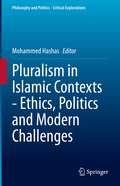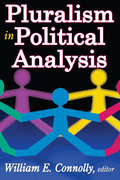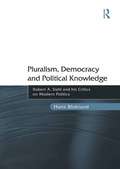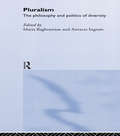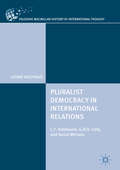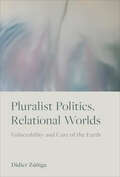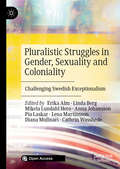- Table View
- List View
Plunder and Deceit: Big Government's Exploitation of Young People and the Future
by Mark R. Levin#1 New York Times bestselling author and radio host Mark R. Levin delivers a "bracing meditation” (National Review) on the ways our government has failed the next generation.In modern America, the civil society is being steadily devoured by a ubiquitous federal government. But as the government grows into an increasingly authoritarian and centralized federal Leviathan, many parents continue to tolerate, if not enthusiastically champion, grievous public policies that threaten their children and successive generations with a grim future at the hands of a brazenly expanding and imploding entitlement state poised to burden them with massive debt, mediocre education, waves of immigration, and a deteriorating national defense. Yet tyranny is not inevitable. In Federalist 51, James Madison explained with cautionary insight the essential balance between the civil society and governmental restraint: “In framing a government which is to be administered by men over men, the great difficulty lies in this: you must first enable the government to control the governed; and in the next place oblige it to control itself.” This essential new book is, against all odds, a likeminded appeal to reason and audacity—one intended for all Americans but particularly the rising generation. Younger people must find the personal strength and will to break through the cycle of statist manipulation, unrelenting emotional overtures, and the pressure of groupthink, which are humbling, dispiriting, and absorbing them; to stand up against the heavy hand of centralized government, which if left unabated will assuredly condemn them to economic and societal calamity. Levin calls for a new civil rights movement, one that will foster liberty and prosperity and cease the exploitation of young people by statist masterminds. He challenges the rising generation of younger Americans to awaken to the cause of their own salvation, asking: will you acquiesce to a government that overwhelmingly acts without constitutional foundation—or will you stand in your own defense so that yours and future generations can live in freedom?
Plunder of the Commons: A Manifesto for Sharing Public Wealth (Pelican Books)
by Guy Standing'One of the most important books I've read in years' Brian EnoWe are losing the commons. Austerity and neoliberal policies have depleted our shared wealth; our national utilities have been sold off to foreign conglomerates, social housing is almost non-existent, our parks are cordoned off for private events and our national art galleries are sponsored by banks and oil companies. This plunder deprives us all of our common rights, recognized as far back as the Magna Carta and the Charter of the Forest of 1217, to share fairly and equitably in our public wealth.Guy Standing leads us through a new appraisal of the commons, stemming from the medieval concept of common land reserved in ancient law from marauding barons, to his modern reappraisal of the resources we all hold in common - a brilliant new synthesis that crystallises quite how much public wealth has been redirected to the 1% in recent decades through the state-approved exploitation of everything from our land to our state housing, health and benefit systems, to our justice system, schools, newspapers and even the air we breathe. Plunder of the Commons proposes a charter for a new form of commoning, of remembering, guarding and sharing that which belongs to us all, to slash inequality and soothe our current political instability.
Plunder: Private Equity's Plan to Pillage America
by Brendan BallouThe authoritative exposé of private equity: what it is, how it kills businesses and jobs, how the government helps, and how we stop it Private equity surrounds us. Firms like Blackstone, Carlyle, and KKR are among the largest employers in America and hold assets that rival those of small countries. Yet few understand what these firms are or how they work. In Plunder, Brendan Ballou explains how private equity has reshaped American business by raising prices, reducing quality, cutting jobs, and shifting resources from productive to unproductive parts of the economy. Ballou vividly illustrates how many private equity firms buy up retailers, medical practices, prison services, nursing-home chains, and mobile-home parks, among other businesses, using little of their own money to do it and avoiding debt and liability for their actions. Forced to take on huge debts and pay extractive fees, companies purchased by private equity firms are often left bankrupt, or shells of their former selves, with consequences to communities that long depended on them. Perhaps most startling is Ballou&’s insight into how this is happening with the active support of various arms of the government. But, as Ballou reveals in an agenda for reining in the industry, private equity can be stopped from wreaking further havoc.
Plundering the North: A History of Settler Colonialism, Corporate Welfare, and Food Insecurity
by Kristin Burnett Travis HayThe manufacturing of a chronic food crisis Food insecurity in the North is one of Canada’s most shameful public health and human rights crises. In Plundering the North, Kristin Burnett and Travis Hay examine the disturbing mechanics behind the origins of this crisis: state and corporate intervention in northern Indigenous foodways. Despite claims to the contrary by governments, the Hudson’s Bay Company (HBC), and the contemporary North West Company (NWC), the exorbitant cost of food in the North is neither a naturally occurring phenomenon nor the result of free-market forces. Rather, inflated food prices are the direct result of government policies and corporate monopolies. Using food as a lens to track the institutional presence of the Canadian state in the North, Burnett and Hay chart the social, economic, and political changes that have taken place in northern Ontario since the 1950s. They explore the roles of state food policy and the HBC and NWC in setting up, perpetuating, and profiting from food insecurity while undermining Indigenous food sovereignties and self-determination. Plundering the North provides fresh insight into Canada’s settler colonial project by re-evaluating northern food policy and laying bare the governmental and corporate processes behind the chronic food insecurity experienced by northern Indigenous communities.
Plunkitt of Tammany Hall: A Series of Very Plain Talks on Very Practical Politics (Dover Thrift Editions)
by William L. RiordonThis classic work presents the candid wit and wisdom of George Washington Plunkitt (1842–1924), a longtime state senator from New York who represented the Fifteenth Assembly District and was especially powerful in New York City. Plunkitt was part of the city's Tammany Hall organization and a cynical practitioner of what today is generally known as "machine politics," a patronage-based system in which politicians openly exercise power for personal gain. Plunkitt defined "dishonest graft" as working solely for one's own interests, as opposed to "honest graft," which involves the interests of one's party and state as well as individual benefits. An enthusiastic party man, he believed in appointments, patronage, spoils, and all the corrupt practices that were curtailed by the civil service law, regarding them as both the rewards and cause of patriotism. Modern readers will find his strikingly modern-sounding motivations and justifications both entertaining and instructive.
Plural Heritages and Community Co-production: Designing, Walking, and Remembering
by Christopher Whitehead Gönül Bozoğlu Tom SchofieldPlural Heritages and Community Co-production is a landmark contribution on the nature and plurality of heritages and how they can be creatively and ethically presented in urban space. Providing an overview of the concept of plural heritages, this book explores the theory, politics, and practice of community co-production as they intersect with currents in critical heritage thinking, walking as ethnography, and digital design methods. Told through a central case study in Istanbul, Turkey, this volume aligns with cultural and political imperatives to consider the plural values, meanings, affects, and relativities of heritage sites for the multiple communities who live – or, as for diaspora and displaced groups, have lived – with them. It suggests a range of methods for locating and valorising alternative perspectives to those centrally deployed through museums or other institutions, such as UNESCO World Heritage listing, while also exploring the complexities of the past in the present and the ontology of heritage. Plural Heritages and Community Co-production will be of great interest to researchers, academics, postgraduate students in the fields of heritage and memory studies, museum studies, history, geography, cultural studies, sociology, anthropology, and politics. The book will also be of interest to heritage professionals, policy makers, and site managers involved in community engagement and participation.
Plural Policing in the Global North: Insights into Concepts, Aspects and Practices
by Nathalie Hirschmann Tobias John Frauke Reichl Jacqueline Abigail GarandThe volume brings together an international group of authors discussing basic concepts and approaches to plural policing as well as aspects and practices of plural policing in specific locations. The context comes from the fact that policing activities are nowadays performed by a growing number and variety of police and non-police stakeholders. This development is internationally discussed as ‘pluralisation of policing’ or plural policing. This book provides insights into plural policing across different countries of the global North. It looks at day-to-day security which is mainly produced at the local level, and where there is considerable diversity in philosophy and practice. Therefore, it allows learnings for possible future developments in the field. This volume contributes to policing studies and is of interest to the wide range of academics dealing with questions of security and order, as well as policy makers and practitioners working on security in their regions.
Pluralism Comes of Age: American Religious Culture in the Twentieth Century
by Charles H. LippyThis acclaimed work surveys the varied course of religious life in modern America. Beginning with the close of the Victorian Age, it moves through the shifting power of Protestantism and American Catholicism and into the intense period of immigration and pluralism that has characterized our nation's religious experience.
Pluralism and Corporatism: The Political Evolution of Modern Democracies (Routledge Library Editions: Political Thought and Political Philosophy #27)
by Reginald J. HarrisonFirst published in 1980. In Pluralism and Corporatism the author examines the ‘pluralist' conception of democratic advanced industrial societies and shows to what extent an alternative conception the ‘corporatist' society is more appropriate today. The book reviews criticisms of standard conceptions of industrial society and draws empirical support for some new approaches from the politics of Britain, France, Germany, Holland, Belgium, Italy, Japan and the United States: an analysis which shows that there are tendencies everywhere towards the fragmentation of government responsibility and its assumption both by governmental and organised group bureaucracies. The author argues that this pattern of policy-making is in fact in conflict with standards of behaviour which are fundamental to the ideal of representative and accountable democratic government. Both critical review and analysis are organised in a way which will maximise the usefulness of Pluralism and Corporatism as a theoretical complement to those more standard texts in comparative government which already provide a study in-depth of individual countries. It seeks to review changing political culture, political economy, party and interest intermediation, bureaucratic influence, constitutional effects on political behaviour and the international constraints upon government which arise from interdependence. It will become essential reading for courses on the politics of advanced industrial societies and particularly of Western Europe.
Pluralism and Diversity: For the Sake of Equal Respect (Political Philosophy and Public Purpose)
by Sylvie BláhováThis book examines what the justification of political power and the character of a liberal political community in the conditions of pluralism should look like, with the aim of equal respect for all. Sylvie Bláhová argues that if those who understand the principle of respect as the basis of political liberalism are to fulfill all the prerequisites of this principle, they must ensure respect within the liberal political community as a whole. The classic interpretation of political liberalism ensures respect during the process of justification of political power, yet many individuals in the liberal political community remain disrespected, mainly due to their group membership. Accordingly, Bláhová looks for a more complex interpretation of the principle of respect within political liberalism, one that ensures respect beyond the justification of political power. The author argues that the way to achieve respect in the liberal political community is to interpret the criterion of reciprocity in a dual way. Specifically, Bláhová claims that respect can be ensured only in conjunction with the principle of civic friendship, which makes respect more comprehensive. This novel interpretation can ensure unity of the liberal political community and make it stable, which is crucial in conditions of pluralism.
Pluralism and Engagement in the Discipline of International Relations
by Yong-Soo EunThis book identifies and addresses subtle but important questions and issues associated with the configuration of International Relations as a discipline. Starting with a much-needed discussion of manifold implications and issues associated with pluralism, the book raises important questions, such as where does the field of IR stand in terms of epistemological, theoretical, and methodological diversity. The book also carries out a comparative analysis of the present status of post-positivist IR scholarship in the United States and China. Eun discusses these questions through a close reading of the key texts in the field and by undertaking a critical survey of publishing and teaching practices in IR communities. IR scholars will gravitate to this text that fills many gaps in international political theory.
Pluralism and Equality
by Imtiaz Ahmad Helmut Reifeld Partha S GhoshWith the end of the Cold War, interest in the core-values of state, pluralism, secularism and equality have intensified. This important volume examines these principal values in the differing historical and socio-cultural contexts of Europe and India, emphasising their fundamental role in democratic governance, and highlighting the wide variations in both their meaning and content in different cultures. Comprising contributions from distinguished scholars, this volume constitutes a lucid and cogent analysis of recent shifts in public policies and political polemics on the meaning and content of various core-values.
Pluralism and Liberal Neutrality
by RICHARD BELLAMY; MARTIN HOLLISThe crisis of liberalism is in its claim to endorse neutral procedures that allow individuals and groups to pursue their own good, when the very possibility of such neutrality is affected by the growth of plural societies, and resulting divisions of loyalty. This collection explores this crisis.
Pluralism and Liberal Politics (Routledge Studies in Contemporary Philosophy)
by Robert TalisseIn this book, Robert Talisse critically examines the moral and political implications of pluralism, the view that our best moral thinking is indeterminate and that moral conflict is an inescapable feature of the human condition. Through a careful engagement with the work of William James, Isaiah Berlin, John Rawls, and their contemporary followers, Talisse distinguishes two broad types of moral pluralism: metaphysical and epistemic. After arguing that metaphysical pluralism does not offer a compelling account of value and thus cannot ground a viable conception of liberal politics, Talisse proposes and defends a distinctive variety of epistemic pluralism. According to this view, certain value conflicts are at present undecidable rather than intrinsic. Consequently, epistemic pluralism countenances the possibility that further argumentation, enhanced reflection, or the acquisition of more information could yield rational resolutions to the kinds of value conflicts that metaphysical pluralists deem irresolvable as such. Talisse’s epistemic pluralism hence prescribes a politics in which deep value conflicts are to be addressed by ongoing argumentation and free engagement among citizens; the epistemic pluralist thus sees liberal democracy is the proper political response to ongoing moral disagreement.
Pluralism and World Order: Theoretical Perspectives and Policy Challenges (IPP Studies in the Frontiers of China’s Public Policy)
by Feng ZhangThis volume explores the implications of pluralism for international order. Distinguished contributors from around the world offer insights into the character of a pluralistic world order. They focus especially on the manifestations of international pluralism in great power relations, multilateralism, and regionalism. Contributors examine the myriad challenges a pluralistic world order will face in the years ahead, yet they eschew alarmist conclusions. There is still scope for the great powers to better manage their relations, and equally important, much space for multilateralism and regionalism to play their increasingly important roles in stabilizing world order. Distinctive in bringing the themes of pluralism and world order together in both theoretical exposition and policy discussion, this book offers a stimulating reading for scholars and practitioners of world politics.
Pluralism and the Idea of the Republic in France
by Julian Wright H. S. JonesThe idea of the centralized State has played a powerful role in shaping French republicanism. But for two hundred years, many have tried to find other ways of being French and Republican. These essays challenge the traditional account, bringing together new insights from leading scholars.
Pluralism by Default: Weak Autocrats and the Rise of Competitive Politics
by Lucan WayAn audacious new explanation for the emergence of political pluralism in weak states.Pluralism by Default explores sources of political contestation in the former Soviet Union and beyond. Lucan Way proposes that pluralism in "new democracies" is often grounded less in democratic leadership or emerging civil society and more in the failure of authoritarianism. Dynamic competition frequently emerges because autocrats lack the state capacity to steal elections, impose censorship, or repress opposition. In fact, the same institutional failures that facilitate political competition may also thwart the development of stable democracy.
Pluralism by Default: Weak Autocrats and the Rise of Competitive Politics
by Lucan Way“Pluralism by Default will change the way we understand the emergence of democracies and the consolidation of autocracies.” —Chrystia Freeland, author of PlutocratsExploring sources of political contestation in the former Soviet Union and beyond, Pluralism by Default proposes that pluralism in “new democracies” is often grounded less in democratic leadership or emerging civil society and more in the failure of authoritarianism. Dynamic competition frequently emerges because autocrats lack the state capacity to steal elections, impose censorship, or repress opposition. In fact, the same institutional failures that facilitate political competition may also thwart the development of stable democracy.“A tour de force brimming with theoretical originality and effective use of in-depth case studies. It will enrich our understanding of post-communist politics and help reshape the way we think about democracy, authoritarianism, and regime change more broadly.” —M. Steven Fish, author of Democracy Derailed in Russia: The Failure of Open Politics
Pluralism in Islamic Contexts - Ethics, Politics and Modern Challenges (Philosophy and Politics - Critical Explorations #16)
by Mohammed HashasThis book brings together international scholars of Islamic philosophy, theology and politics to examine these current major questions: What is the place of pluralism in the Islamic founding texts? How have sacred and prophetic texts been interpreted throughout major Islamic intellectual history by the Sunnis and Shi‘a? How does contemporary Islamic thought treat religious and political diversity in modern nation states and in societies in transition? How is pluralism dealt with in modern major and minor Islamic contexts? How does modern political Islam deal with pluralism in the public sphere? And what are the major internal and external challenges to pluralism in Islamic contexts? These questions that have become of paramount relevance in religious studies especially during the last three-four decades are answered as critically highlighted in Islamic founding sources, the formative classical sources and how it has been lived and practiced in past and present Islamic majority societies and communities around the world. Case studies cover Egypt, Turkey, Indonesia, and Thailand, besides various internal references to other contexts.
Pluralism in Political Analysis
by Francis A. O'ConnellThe theory of democratic pluralism has long provided the dominant ideal and description of politics in industrial societies with competing party systems. The purpose of this classic collection, including some of the leading theorists of the late 1960s, is to subject this theory to systematic scrutiny. The authors examine the work of such pluralists as Robert Dahl, David Truman, Adolf Berle, Arthur Bentley, Joseph Schumpeter, and Walter Lippmann, as well as of such critics of pluralist theory as C. Wright Mills, Herbert Marcuse, Henry Kariel, and Grant McConnell.Voicing the respective points of view of science, economics, philosophy, and psychology, the authors converge in their agreement that the conventional, pluralist interpretation of contemporary politics requires significant revision. The views of these diverse critics coalesce into the outline of what they see as a more enlightened political ideal and a more relevant descriptive theory. This collective portrait offers a provocatively new interpretative framework for the understanding of the politics of contemporary industrial society.Connolly includes a sophisticated discussion of such concepts as power, decision-making, politics, and interest groups and devotes considerable attention to the need to promote positive change, particularly where the pluralist system shows bias against certain segments of society as well as against some dimensions of social life affecting everyone's existence in the society. Intended for use in Comparative Government, Contemporary Political Theory, Political Parties and Pressure Groups, and advanced courses in American Government, this volume remains a challenging resource for those dealing with the nature and possible change of the organization of contemporary democratic society.
Pluralism, Democracy and Political Knowledge: Robert A. Dahl and his Critics on Modern Politics
by Hans BloklandThe political discontent or malaise that typifies most modern democracies is mainly caused by the widely shared feeling that the political freedom of citizens to influence the development of their society and, related to this, their personal life, has become rather limited. We can only address this discontent when we rehabilitate politics, the deliberate, joint effort to give direction to society and to make the best of ourselves. In Pluralism, Democracy and Political Knowledge, Hans Blokland examines this challenge via a critical appraisal of the pluralist conception of politics and democracy. This conception was formulated by, above all, Robert A. Dahl, one of the most important political scholars and democratic theorists of the last half century. Taking his work as the point of reference, this book not only provides an illuminating history of political science, told via Dahl and his critics, it also offers a revealing analysis as to what progress we have made in our thinking on pluralism and democracy, and what progress we could make, given the epistemological constraints of the social sciences. Above and beyond this, the development and the problems of pluralism and democracy are explored in the context of the process of modernization. The author specifically discusses the extent to which individualization, differentiation and rationalization contribute to the current political malaise in those countries which adhere to a pluralist political system.
Pluralism: The Philosophy and Politics of Diversity
by Maria Baghramian and Attracta IngramCultural, moral and religious diversity is a pervasive feature of modern life, yet has only recently become the focus of intellectual debate. Pluralism is the first book to tackle philosophical pluralism and link pluralist themes in philosophy to politics. A range of essays investigates the philosophical sources of pluralism, the value of pluralism and liberalism, and difference in pluralism, including writings on women and the public-private distinction.This is a valuable source for students of philosophy, politics and cultural studies.
Pluralist Democracy in International Relations: L. T. Hobhouse, G. D. H. Cole, And David Mitrany (The\palgrave Macmillan History Of International Thought Ser.)
by Leonie HolthausThis book demonstrates the importance of democracy for understanding modern international relations and recovers the pluralist tradition of L.T. Hobhouse, G.D.H. Cole, and David Mitrany. It shows that pluralism’s typical interest in civil society, trade unionism, and transnationalism evolved as part of a wide-ranging democratic critique that representative democracies are hardly self-sustaining and are ill-equipped to represent all entitled social and political interests in international relations. Pluralist democratic peace theory advocates transnational loyalties to check nationalist sentiments and demands the functional representation of social and economic interests in international organizations. On the basis of the pluralist tradition, the book shows that theories about domestic democracy and international organizations co-evolved before scientific liberal democratic peace theory introduced new inside/outside distinctions.
Pluralist Politics, Relational Worlds: Vulnerability and Care of the Earth
by Didier ZúñigaIn Pluralist Politics, Relational Worlds, Didier Zúñiga examines the possibility for dialogue and mutual understanding in human and more-than-human worlds. The book responds to the need to find more democratic ways of listening to, giving voice to, and caring for the variety of beings that inhabit the earth. Drawing on ecology and sustainability in democratic theory, Zúñiga demonstrates the transformative potential of a relational ethics that is not only concerned with human animals, but also with the multiplicity of beings on earth, and the relationships in which they are enmeshed. The book offers ways of cultivating and fostering the kinds of relations that are needed to maintain human and more-than-human diversity in order for life to persist. It also calls attention to the quality of the relationships that are needed for life to flourish, advancing our understanding of the diversity of pluralism. Pluralist Politics, Relational Worlds ultimately presses us to question our own condition of human animality so that we may reconsider the relations we entertain with one another and with more-than-human forms of life on earth.
Pluralistic Struggles in Gender, Sexuality and Coloniality: Challenging Swedish Exceptionalism
by Linda Berg Diana Mulinari Lena Martinsson Anna Johansson Cathrin Wasshede Erika Alm Mikela Lundahl Hero Pia LaskarThis open access book seeks to understand how politics is being made in a pluralistic sense, and explores how these political struggles are challenging and transforming gender, sexuality, and colonial norms. As researchers located in Sweden, a nation often cited as one of the most gender-equal and LGBTQ-tolerant nations, the contributions investigate political processes, decolonial struggles, and events beyond, nearby, and in between organizations, states, and national territories. The collection represents a variety of disciplines, and different theoretical conceptualizations of politics, feminist theory, and postcolonial and queer studies. Students and researchers with an interest of queer studies, gender studies, critical whiteness studies, and civil society studies will find this book an invaluable resource.
